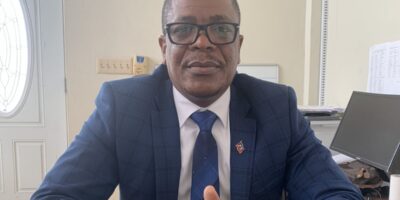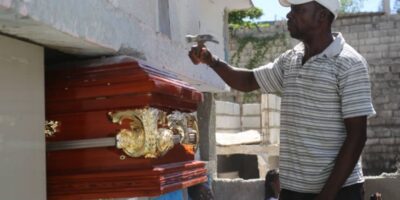To rebuild our nation, we need a pragmatic approach that recognizes the limitations imposed by a divided civil society and political class.
Early on February 7th, the morning news reported members of the armed militia, the Brigade for Protected Areas (BSAP), were driving through the deserted streets of Pétion-Ville, and that police had abandoned their posts.
This fueled hopes that the long-hoped-for revolution proposed by Guy Philippe—recently released from US prisons for money laundering and drug trafficking—was finally unfolding. However, by nightfall, the news had dramatically shifted. It was reported that five BSAP members were dead, and three were detained. Mr. Phillipe was nowhere to be found and the budding protests swiftly quelled.
The population’s hope for a revolution is the result of Prime Minister Henry’s abysmal leadership, which has been marked by cynicism and a blatant disregard for the people’s suffering. In their desperation, the people clung to any glimmer of hope, even from figures like Philippe and the BSAP—both, symbols of the very status quo people oppose. This raises critical questions about the opposition’s direction and potential to bring about a new system.
The population’s hope for a revolution is the result of Prime Minister Henry’s abysmal leadership, which has been marked by cynicism and a blatant disregard for the people’s suffering.
The day was special because the Haitian National Police (HNP) demonstrated its operational capacity. The often-ineffective police responded swiftly and firmly to the protesters and BSAP. However, the selective nature of this deployment raises concerns about the police’s impartiality and its potential for abuse of power.
Facing Realities: Rethinking Strategies for Haiti’s Future
The swift end to the February 7th “revolution” and its lack of clear leadership underscored the weaknesses of Haitian civil society, particularly among those opposing the Kenya-led Multinational Security Support (MSS) mission.
This context made Prime Minister Henry’s address to the nation in the middle of the night, echoing US opposition to another transition, seem especially dismissive. However, it’s crucial to accept an uncomfortable reality: the current opposition lacks the capacity to remove Mr. Henry. While frustrating, this should be a wake-up call for activists to re-evaluate their strategies.
Furthermore, given the current political climate and the limited power of the existing actors, calls from organizations in the diaspora asking the US to oust Prime Minister Henry (“stop the prop”) or those who want to engage in armed resistance appear unrealistic. Mr. Henry must and will leave office, but it appears that the true contenders to replace him remain hidden, waiting for the right moment to emerge.
It’s crucial to accept an uncomfortable reality: the current opposition lacks the power to remove Henry. While frustrating, this should be a wake-up call for activists to re-evaluate their strategies.
Post-Coup Uncertainty: Points of Consensus
After the failed February 7th attempt to overthrow the government, figures like Mr. Philippe and former Senator Jean-Charles resurfaced with familiar arguments. And while the debates around their involvement and BSAP continue to divide the community, some potential points of agreement might exist:
- Prime Minister Henry’s leadership is unacceptable: His inaction and disregard for the Haitian people are widely agreed upon.
- The international actors play a significant role: The influence of the US, France, Canada, and the UN in Haitian politics is acknowledged by all.
- The Haitian National Police is central to Haiti’s security: Their ability to combat gangs is now recognized, but concerns about their reach and integrity persist.
- Genuine leadership is desperately needed: The public yearns for honest and effective leaders who are currently absent.
- Emotional reactions solve little: Blaming the US for supplying arms, even while Haitians continue to get convicted for gun trafficking, is unproductive and offers no solutions.
- The fragmented opposition needs change: The opposition’s division and ineffectiveness reflect the status quo we seek to replace.
- Long-term solutions are necessary: The revolution won’t happen overnight and cannot be a quick fix.
The undeniable frustration and confusion surrounding Haiti’s current situation naturally fuels anger and despair, which impede our ability to develop constructive strategies. To rebuild our nation, we need a pragmatic approach that recognizes the limitations imposed by a divided civil society and political class. The current opposition, lacking unity and effectiveness, cannot unseat Mr. Henry. With numerous factions vying for power—EDE, En Avant, Lavalas, GREH, Pitit Dessalines, Montana, PHTK, and more—even if Mr. Henry resigned, deeper issues would remain unaddressed making finding a solution a daunting task.
The current opposition, lacking unity and effectiveness, cannot unseat Henry.
The international community understands this reality even if their solutions are biased and often patronizing. Nevertheless, Haitian political analysts and actors must incorporate these facts into their assessments and plans of action.
Beyond Anger: Navigating Haiti’s Challenges with Pragmatism
The last two and a half years under Prime Minister Henry have been disastrous, leaving Haiti reeling like it was hit by another devastating earthquake. While demanding his resignation is understandable, and necessary, it’s not enough. We must confront the profound cracks within Haitian society. It’s deeply concerning that individuals who incite violence, like Mr. Philippe and former Senator Jean-Charles who incited his followers to “burn the country down”, are even considered potential leaders.
This doesn’t mean we’re powerless. While skepticism of external assistance is understandable, it must not blind us to potential opportunities. We must evaluate all options with an open mind, not from a position of weakness, but as a matter of strategic consideration. Many activists have been, at best, timid about the sanction regime and steadfast against the MSS mission. Now may be the time to reconsider those policies because power doesn’t solely reside in accepting or rejecting help. It lies in critically assessing how to best leverage any resource for our nation’s benefit.
Read also : The case of Kenya’s intervention in Haiti reveals a flaw in the Kenyan Constitution
The sanctions, for example, could offer valuable tools for neutralizing the destabilizing actors in Haiti. Indeed, we should be advocating for well designed and swiftly implemented sanctions that target the financial heart of gangs and their benefactors. Striking at their finances through asset freezes, transaction blocks, and trade limitations could significantly hinder their operations. Additionally, the threat of sanctions could deter individuals and businesses from continuing to support gangs, further weakening their capacity.
We must confront the profound cracks within Haitian society. It’s deeply concerning that individuals who incite violence, like Mr. Philippe and former Senator Jean-Charles who incited his followers to “burn the country down”, are even considered potential leaders.
Isolating key figures like gang leaders, their financiers, and money launderers could further disrupt their networks and weaken their influence.
Another policy is the MSS mission. This policy is not a silver bullet and cannot solve the gang problem. Indeed, its effectiveness and scope should be debated. However, dismissing it is a mistake. While organizations like the Institute for Justice and Democracy in Haiti (IJDH) & Bureau des Avocats Internationaux (BAI) are challenging the mission in Kenyan courts—an absolute right and role for civil organizations—the political actors may want to consider a parallel approach, which is to advocate for a refined mission instead.
Indeed, Haitian actors’ response to complex situations is often hampered by a lack of preparedness and adaptability. Stakeholders cling to single-minded approaches, which often fail to adapt to changing circumstances. When these strategies inevitably crumble, a scramble for alternatives ensues, perpetuating a reactive cycle that prioritizes crisis response over proactive preparation. For those seeking the removal of Prime Minister Henry, strengthening the Haitian National Police (HNP) should be a top priority. The HNP’s response on February 7th demonstrates both the potential and complexities involved.
Instead of solely opposing the MSS mission, Haitian organizations could advocate for a refined approach. This could involve focusing on building HNP capacity through technical assistance provided by the MSS. Rather than complaining about what the Kenyans are getting for leading the mission they could demand that a portion of MSS resources be earmarked specifically for the HNP. Additionally, the forces within the MSS mission shouldn’t be directly engaged in combat with gangs. This fight should be led by Haitians to free themselves. With the right framework, including the full participation of Haitians in decision-making positions, the mission’s role could be more valuable in preventing corruption and reprisal actions within the HNP. This could involve monitoring human rights practices, providing tactical expertise, and assisting in investigations of potential collusion between HNP officers and criminal groups.
Isolating key figures like gang leaders, their financiers, and money launderers could further disrupt their networks and weaken their influence.
Ultimately, the success of any effort to remove Mr. Henry hinges on a reformed and empowered HNP. This requires they get better training and equipments, but also a fundamental restructuring to ensure professional conduct and public trust.
Navigating Haiti’s Challenges with Pragmatism
Haiti’s current crisis fuels frustration and despair, obscuring the path forward. Yet, saving our nation demands a pragmatic approach that confronts harsh realities head-on. We must acknowledge the limitations: a divided opposition, a fragmented civil society, and a complex political landscape where even Prime Minister Henry’s removal wouldn’t guarantee progress. Numerous factions vying for power add further complexity.
While blaming external actors like the US or solely attributing problems to exploitation is understandable, it traps us in anger and hinders progress. We need to actively pursue pragmatic strategies that consider our situation’s complexities and explore all available options.
Healthy skepticism towards external solutions is important, but we must also be open to possibilities. Sanctions could target destabilizing actors, while the MSS mission, even if not a perfect solution for gangs, could empower the Haitian National Police. Recognizing these possibilities, even if challenging, is crucial for Haiti’s future.
February 7th events should serve as a wake-up call. We must move beyond anger and despair. We need unity, strategic collaboration, pragmatism, and a willingness to explore all avenues, even those that seem challenging, to bring peace and security to Haiti.
Cover Image : Men identifying themselves as students protest, ready to throw stones, against the unfolding of the carnival, on the second day, Monday, February 12th. | Jean Feguens Regala/AyiboPost
Stay in touch with AyiboPost through :
► Our WhatsApp channel : click here
► Our WhatsApp Community : click here
► Our Telegram canal : click here







Comments